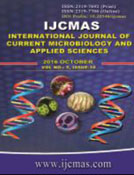


 National Academy of Agricultural Sciences (NAAS)
National Academy of Agricultural Sciences (NAAS)

|
PRINT ISSN : 2319-7692
Online ISSN : 2319-7706 Issues : 12 per year Publisher : Excellent Publishers Email : editorijcmas@gmail.com / submit@ijcmas.com Editor-in-chief: Dr.M.Prakash Index Copernicus ICV 2018: 95.39 NAAS RATING 2020: 5.38 |
Five cellulose-decomposing Bacillus strains were isolated and the highly efficient two strains that were putatively identified as Bacillus megaterium and Bacillus brevis were used in the composting process. Plant residues were collected from the mown grass of King Abdulaziz University and composted for 60 days under aerobic conditions. Samples from the composting material were taken at 0, 12, 14, 33, 50 and 60 days and monitored for physical, chemical and microbiological analysis. The temperature of the compost pile rose to 44.0 ºC after one day of composting and reached its peak of 55.0 ºC after four days and lasted above 45.0 ºC until 30 days. The pH value of the residues decreased during the first 14 days of the composting process to reach 5.0 and thereafter it increased to reach 8.6 at the end of this process. The organic matter and carbon content of plant residues gradually decreased during the composting process and the biodegradability coefficient of the composting process was 0.5. The C:N ratio was narrowed rapidly to reach 14.0 in the produced compost. The N, P and K contents of the residues increased with increasing the composting period to reach 3.0, 0.73 and 2.4%, respectively, in the resultant compost. Moreover, the number of total microbe count, cellulose-decomposing microorganisms, fungi and actinomycetes gradually decreased within the first 14 days of the composting process and then, they increased after 33 days except the actinomycetes, that continued to decrease up to 50 days of composting.
 |
 |
 |
 |
 |